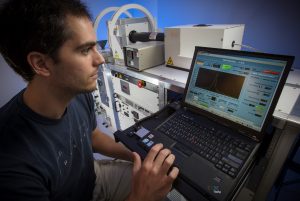Graduate Study
Learn more about studying biomedical imaging in conjunction with the Biomedical Research Imaging Center.
 Students interested in performing graduate research in biomedical imaging can do so through several different channels. Although the BRIC itself does not offer degrees, students can work towards several different degree programs to receive training in biomedical imaging and participate in imaging research with BRIC faculty. The following departments work closely with the BRIC to provide graduate education in various aspects of biomedical imaging. Students interested in working in biomedical imaging and the BRIC should consider obtaining their degree through one of the following programs that best matches their area of interest.
Students interested in performing graduate research in biomedical imaging can do so through several different channels. Although the BRIC itself does not offer degrees, students can work towards several different degree programs to receive training in biomedical imaging and participate in imaging research with BRIC faculty. The following departments work closely with the BRIC to provide graduate education in various aspects of biomedical imaging. Students interested in working in biomedical imaging and the BRIC should consider obtaining their degree through one of the following programs that best matches their area of interest.
- Biomedical Engineering – The Joint Department of Biomedical Engineering (BME) offers M.S. and Ph.D. degrees, with a specialty in Biomedical Imaging. Students enrolled in Biomedical Engineering can perform thesis research for any BRIC faculty member. Interested students should apply directly to the BME program. To learn more, visit the BME website (http://www.bme.unc.edu/
- Biostatistics – The Department of Biostatistics offer undergraduate, M.S., MPH, Dr.Ph, and Ph.D. degrees, with a specialty in quantitative research including clinical trial, genetic analysis, and imaging analysis in the biomedical sciences. BIOS is one the top four biostatistics departments of its kind in the world. Interested students should apply directly to the BIOS program. To learn more, visit the BIOS website (http://sph.unc.edu/bios/biostatistics/
- Computer Science – The Department of Computer Science offers undergraduate, M.S., and Ph.D. degrees. The department of computer science has a long history of image analysis research (both in medical image analysis and computer vision) as well as graphics and visualization research. Computer science offers a variety of undergraduate and graduate courses on image analysis. Visit the CS website (http://www.cs.unc.edu) to learn more.
- Neuroscience – The Neurobiology Curriculum offers Ph.D. degrees. Students apply through the Biological and Biomedical Sciences Program, and spend their first year rotating in BBSP labs, which include the labs of many BRIC faculty. At the end of the first year, students select a Neurobiology lab for their thesis research. To learn more, visit the Neurobiology ( http://www.med.unc.edu/neurobiology ) and BBSP (http://bbsp.unc.edu/ ) websites.
- Physics – The Department of Physics and Astronomy (link to http://physics.unc.edu/) offers a graduate program emphasizing students interested in the Ph.D. The department’s research emphasis in Biological and Medical Physics (link to http://physics.unc.edu/research-pages/bio-med-physics/) has strong ties to the BRIC via developing novel imaging applications in CT, MRI, optical, and ultrasound. Interested applicants should apply directly to the graduate physics program (link to http://physics.unc.edu/graduate-program/apply/).
- Psychology – The Psychology Department offers Ph.D. degrees. Students apply through individual Graduate Programs. There are currently faculty conducting neuroimaging work within every Graduate Program in the Department. To learn more, visit the Psychology Department website ( http://psychology.unc.edu/graduate-studies/).